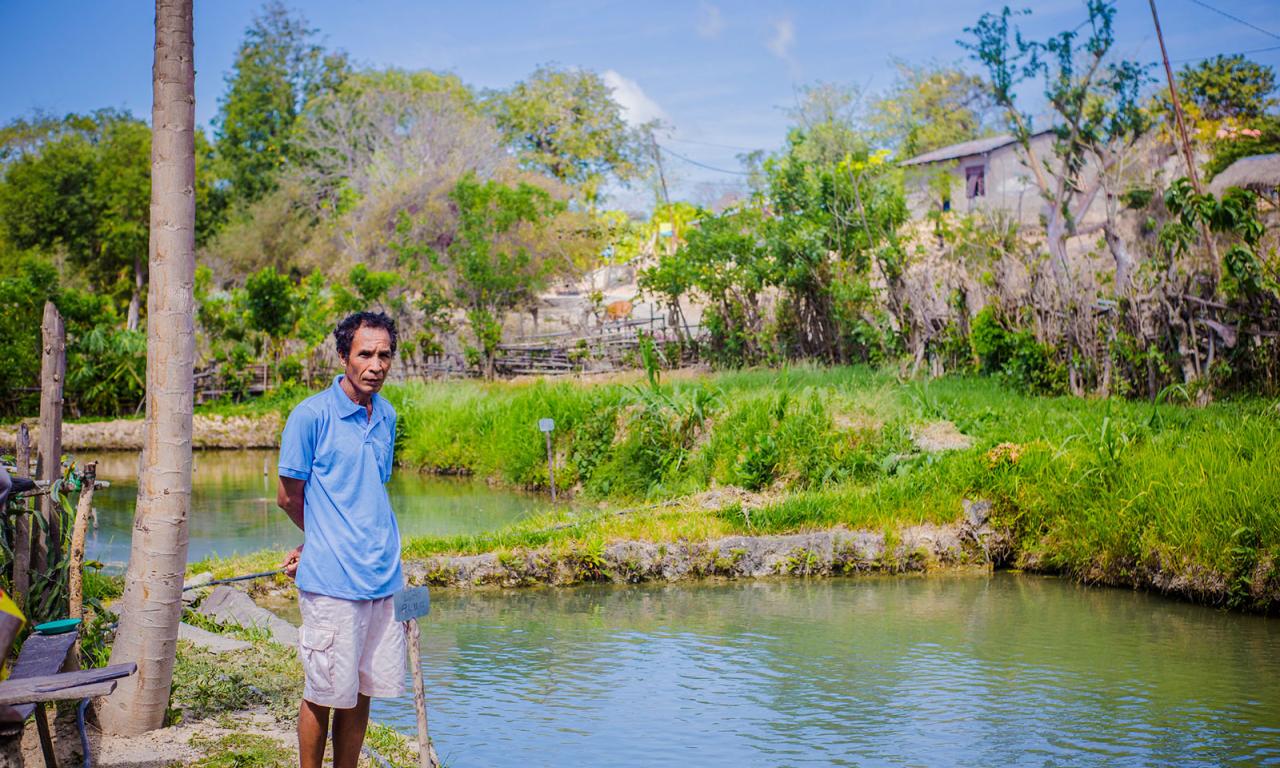
The new Black Bird GIFT hatchery provides local fish farmers in Timor-Leste with access to quality fish seed, helping to boost their production to improve food and nutrition security and support increased incomes.
José Aleixo do Carmo Aniceto has been farming fish, mostly goldfish and mixed-sex tilapia, for more than 20 years.
In 2020, Aniceto started farming a new species—monosex genetically improved farmed tilapia (GIFT)—after being introduced to it by the Partnership for Aquaculture Development in Timor-Leste Phase 2 project (PADTL2) led by WorldFish.
“I really like to learn and was inspired by friends to try farming GIFT,” said the father-of-five, who also farms poultry, cattle, and vegetables and works as a bus driver.
GIFT is a hardy and fast-growing species of tilapia developed by WorldFish for more than 30 years. The species can thrive in low-input environments—like the types of fish farms operated in rural Timor-Leste.
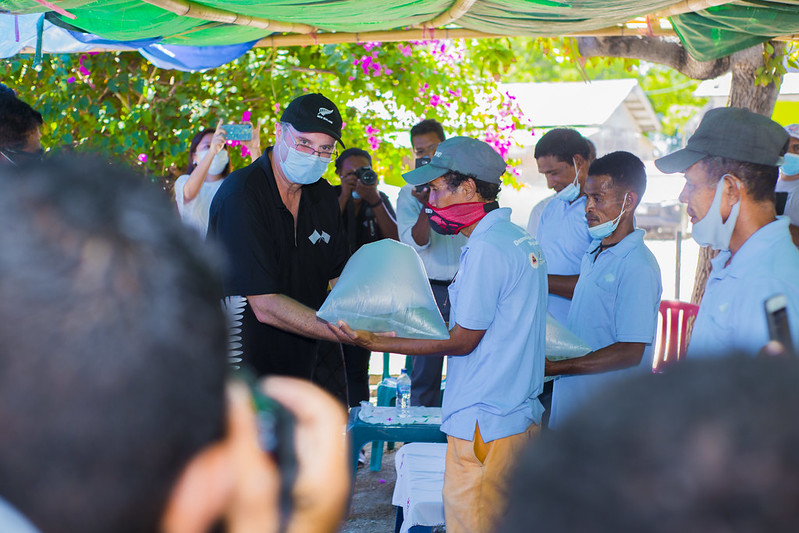
Aniceto is delighted that he can start harvesting GIFT in six months, unlike other species that take longer to mature.
“During the pandemic lockdown, my family consumed some of the tilapia as a source of protein,” said Aniceto, who grows GIFT in three of his five ponds.
Despite only farming GIFT for a short time, Aniceto plans to continue as it provides an important source of nutrition and income.
“I wish to buy my own fingerlings without support from the PADTL2 project,” said the 59-year old from Ipar Ira, Lautem, a four-hour drive from the capital Dili.
New hatchery to improve fingerlings access
For a long time, fish farmers in Timor-Leste have struggled to source quality fingerlings, which are needed to enhance fish growth and achieve higher yields.
The PADTL2 project, as part of the CGIAR Research Program on Fish Agri-Food Systems (FISH) led by WorldFish, is combating this problem by working with private sector actors and the Ministry of Agriculture and Fisheries (MAF) to establish public-private-partnership (PPP) model GIFT hatcheries.
On 5 October 2021, the Black Bird GIFT hatchery in Lautem municipality was officially inaugurated at an event attended by local farmers and community members, government representatives and project staff.
The GIFT hatchery is the first one established in the east of the half-island nation. Its construction was partly funded by the New Zealand Ministry of Foreign Affairs and Trade (MFAT) through the PADTL2 project, which is implemented in partnership with MAF.
“Aquaculture can provide an excellent source of micronutrients to consumers and increase farmers’ income,” said New Zealand Ambassador Phillip Hewitt at the hatchery inauguration event.
“The New Zealand Government is committed to continue supporting the Timor-Leste Government to guarantee the sustainability of the country’s aquaculture development,” he said, referencing the New Zealand Government’s eight years of ongoing support.
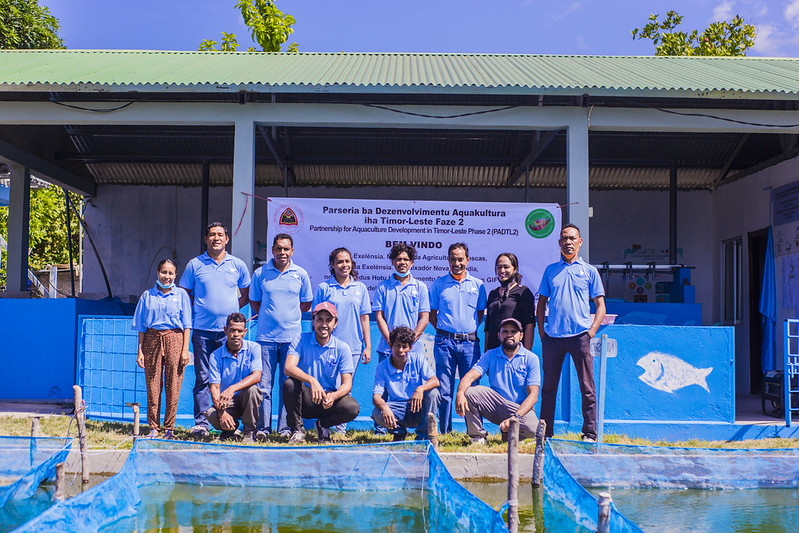
The Black Bird hatchery is the second established in Timor-Leste under a PPP model. The first was the Leohitu PPP hatchery in Bobonaro municipality, in the country’s west, which was launched in June 2019.
Under the PPP model, the hatchery owner contributes 50 percent of construction costs and manages most of the ongoing costs. The PADTL2 project contributes the other 50 percent of construction costs, funds some of the running costs in the initial years of operation, and provides ongoing technical support.
“This approach ensures a hatchery’s sustainability due to the sense of ownership felt by the owner,” explained Mario Pereira, Timor-Leste Country Representative, WorldFish, at the inauguration ceremony.
The Black Bird hatchery will acquire high-quality broodstock from the government-run GIFT hatchery in Gleno, Ermera, which was established by phase one of the project (PADTL1) in March 2016.
Cooperation between the public and private sector is key to sustainable aquaculture, said Pedro dos Reis, Minister of Agriculture and Fisheries (MAF), at the inauguration event.
“The ministry has a plan to orient other municipalities to have their own local producer of fingerlings to meet community demand and ensure access to GIFT fingerlings,” he said.
Operation of the Black Bird hatchery is critical to supporting progress toward the government’s Timor-Leste National Aquaculture Development Strategy (2012–2030).
The strategy sets out some key targets for 2030—to increase fish production to 12,000 tons per year and reduce malnutrition by increasing fish consumption from 6.1 kg to 15 kg per person each year.
In February 2021, the United States Agency for International Development (USAID) started a partnership with the PADTL2 project, helping to accelerate efforts to achieve the national aquaculture targets.
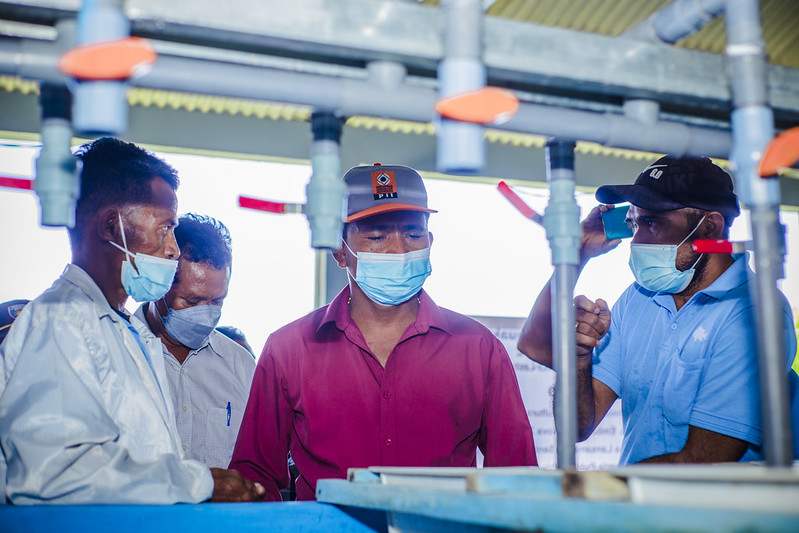
Seeding a bright future
Each year, the Black Bird hatchery is expected to produce more than 1 million fingerlings. These will be sold to many fish farmers in Lautem and the nearby municipalities of Baucau and Viqueque, as well as to non-government organizations supporting aquaculture development.
Since the hatchery started operating in April 2020, the hatchery has produced 85,000–105,000 fingerlings every month.
Already, Mercy Corps and other partners have purchased and distributed fingerlings to fish farmers they work with in Aileu, Ainaro and Same municipalities.
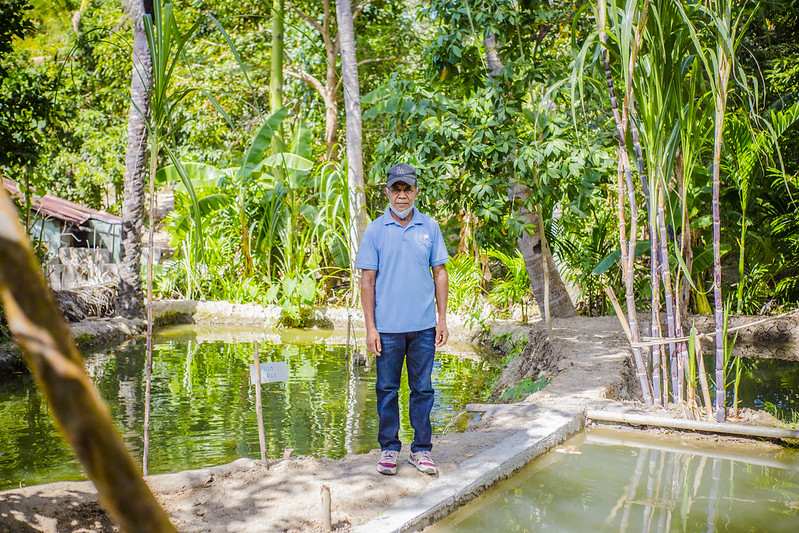
Having a GIFT hatchery nearby is a “huge benefit”, said Domingos Da Silva Brites, who started fish farming in September 2020 with support from the PADTL2 project.
“I will definitely buy [high quality] fingerlings from the hatchery,” said the 71-year-old from Moro village, Parlamento. “It will save us farmers from spending money on delivery fees.”
Since he started fish farming, Brites has sold 350 fish for a total of USD 220.50 and kept 12 fish for home consumption.
Having access to quality seed will support Brites to continue fish farming, which provides his 11-person household with vital nutrition and an income to pay for his children’s school fees and buy fish feed.
“I want to continue farming and expand my [four] ponds,” he said.
Related content:
- Pathway to prosperity: Aquaculture in Timor-Leste set to grow after 10 years of development
- How farmed fish is nourishing rural households in Timor-Leste
Related publications:
